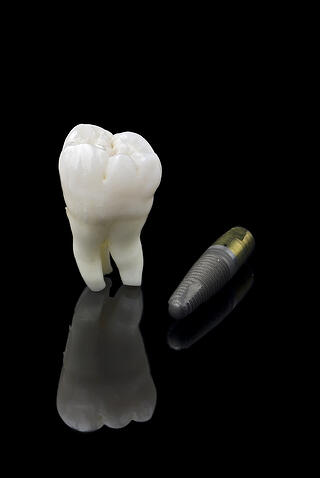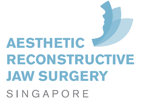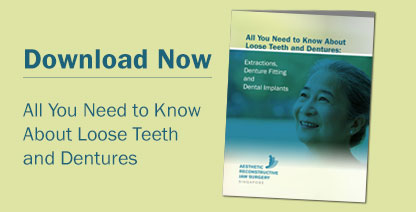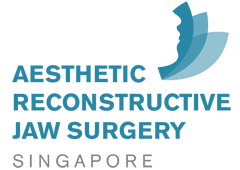Share this
Can You Replace All Of Your Missing Teeth?
on April 8, 2014
 Can you replace all of your missing teeth? Yes, you can. If you have suffered extensive or total tooth loss, don't be discouraged, there are a number of options available to you to replace all of the teeth you have lost. Generally, the first suggestion you'll hear from your Singapore dental professional is dental implants, since they provide dental restorations that more closely resemble the structure, strength and stability of natural teeth than any other option. Other common options for replacing missing teeth include fixed dental bridges and partial or full removable dentures.
Can you replace all of your missing teeth? Yes, you can. If you have suffered extensive or total tooth loss, don't be discouraged, there are a number of options available to you to replace all of the teeth you have lost. Generally, the first suggestion you'll hear from your Singapore dental professional is dental implants, since they provide dental restorations that more closely resemble the structure, strength and stability of natural teeth than any other option. Other common options for replacing missing teeth include fixed dental bridges and partial or full removable dentures.
Dental Implants Singapore
Dental restorations built upon a foundation of dental implants are considered the optimal means replacing missing teeth by most Singapore dental professionals. Among the chief advantages of implant-based restoration is that the tooth root is replaced, rather than just the crown, unlike any other option. That simple difference creates a number of advantages for patients, including protection against bone loss, as well as greater stability, longevity – the average lifespan of a dental implant is 25 years – and a more natural look and feel than any other tooth replacement option.
Dental implants can be used to replace any number of missing teeth. Individual teeth may be replaced one-by-one, with each missing tooth root replaced with a dental implant, which is crowned with a replacement tooth. If you have several adjacent missing teeth, an implant-supported permanent bridge may be the most practical solution. If you've lost all teeth in one jaw or both, dental restoration can be done by placing between four and eight implants in each jaw to support a full arch of replacement teeth.
Dental Bridges
Fixed dental bridges are another common option for replacing missing teeth, and can replace a single missing tooth or a span of several. They are supported by natural teeth at either end of the gap to be filled, typically by crowning those teeth, with the bridge consisting of one or more crowns at each end, between which are fixed the required number of replacement teeth.
Fixed dental bridges can restore oral function and appearance, but they do have some disadvantages as compared to dental implants. Since the area beneath the bridge is left with no tooth roots, bone loss will occur. Natural teeth must be altered to accept the supporting crowns, which can weaken their structure and promote decay. Fixed bridges, on average, must be replaced ever seven to ten years, leading to continuing dental work and expense.
Removable Dentures
Removable dentures are another option for replacing missing teeth, with partial dentures typically used in extensive tooth loss and full dentures used in total tooth loss. Both rest on the gum line, with partials secured by clasps that grip adjacent natural teeth and full dentures retained by the support of the gum ridge and underlying bone. Upper full dentures also gain support from suction between the denture and the roof of the mouth.
Removable dentures also have some disadvantages as compared to implant-based restorations. Bone loss is a problem with both partial and full dentures, which causes the gum ridge that supports them to shrink as well, making refitting or replacement necessary every five to ten years. Partials can cause excessive wear and damage to natural teeth that support them, and full dentures are prone to instability as the gum ridge shrinks, particularly lower ones.
Which is best for you depends upon your personal circumstances and preferences. Your own Singapore dental professional, who will be familiar with those details, can help you devise a treatment plan to achieve that attractive, gap-free smile you have in mind.
Learn more by downloading our free ebook, All You Need to Know About Loose Teeth and Dentures.
Share this
- Jaw Surgery (93)
- Dental Implants Singapore (90)
- Orthognathic Surgery (48)
- Replacing Missing Teeth (26)
- Missing Teeth Options (23)
- Underbite (23)
- Bone Grafting (21)
- Costs (18)
- Facial Aesthetics (18)
- Aesthetics (17)
- dental implants (16)
- corrective jaw surgery (15)
- BOTOX (11)
- Dermal Fillers (11)
- Wisdom teeth (10)
- Fixed Implant Dentures (8)
- Loose Dentures Singapore (6)
- Medisave (6)
- sleep apnea (6)
- Braces (5)
- Dental Pain (5)
- Dentures in Singapore (5)
- Loose Teeth (5)
- Tooth Extraction (5)
- jaw deformities (5)
- bimax (4)
- bone graft (4)
- maxillomandibular advancement (4)
- all-on-4 (3)
- bimaxillary protrusion (3)
- chin implant (3)
- facial asymmetry (3)
- full mouth dental implants (3)
- genioplasty (3)
- immediate implant (3)
- removal of an integrated dental implant (3)
- third molars (3)
- wisdom tooth surgery (3)
- My Dentures Don't Fit (2)
- VME (2)
- bone graft healing (2)
- distraction osteogenesis (2)
- medical tourism (2)
- obstructive sleep apnea (2)
- orthodontics (2)
- plastic surgery (2)
- CT guided dental implants (1)
- Double jaw surgery (1)
- Invisalign (1)
- Periodontal Disease (1)
- Permanent Dentures Singapore (1)
- before and after photos (1)
- facial trauma (1)
- fractured dental implant (1)
- oral appliance therapy (1)
- root canal treatment (1)
- veneers (1)
- vertical maxillary excess (1)
- September 2019 (2)
- July 2019 (2)
- May 2019 (2)
- August 2018 (1)
- October 2017 (1)
- September 2017 (2)
- August 2017 (1)
- June 2017 (2)
- May 2017 (4)
- April 2017 (1)
- March 2017 (1)
- February 2017 (3)
- January 2017 (3)
- December 2016 (1)
- November 2016 (2)
- October 2016 (4)
- September 2016 (9)
- August 2016 (5)
- July 2016 (11)
- June 2016 (14)
- May 2016 (6)
- April 2016 (2)
- March 2016 (1)
- January 2016 (7)
- December 2015 (10)
- November 2015 (4)
- October 2015 (9)
- September 2015 (7)
- August 2015 (1)
- July 2015 (6)
- June 2015 (3)
- May 2015 (7)
- April 2015 (5)
- March 2015 (8)
- January 2015 (5)
- December 2014 (7)
- November 2014 (7)
- October 2014 (6)
- September 2014 (8)
- August 2014 (5)
- July 2014 (7)
- June 2014 (8)
- May 2014 (9)
- April 2014 (10)
- March 2014 (6)
- February 2014 (8)
- January 2014 (3)
Subscribe by email
Email subscription




No Comments Yet
Let us know what you think